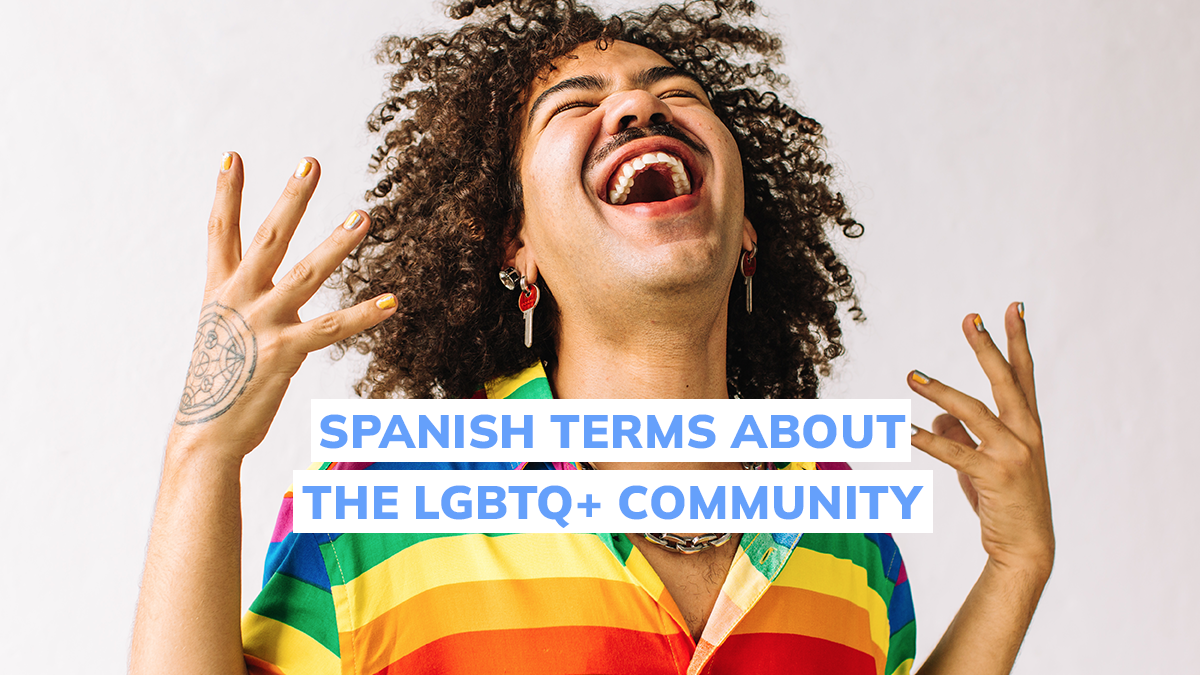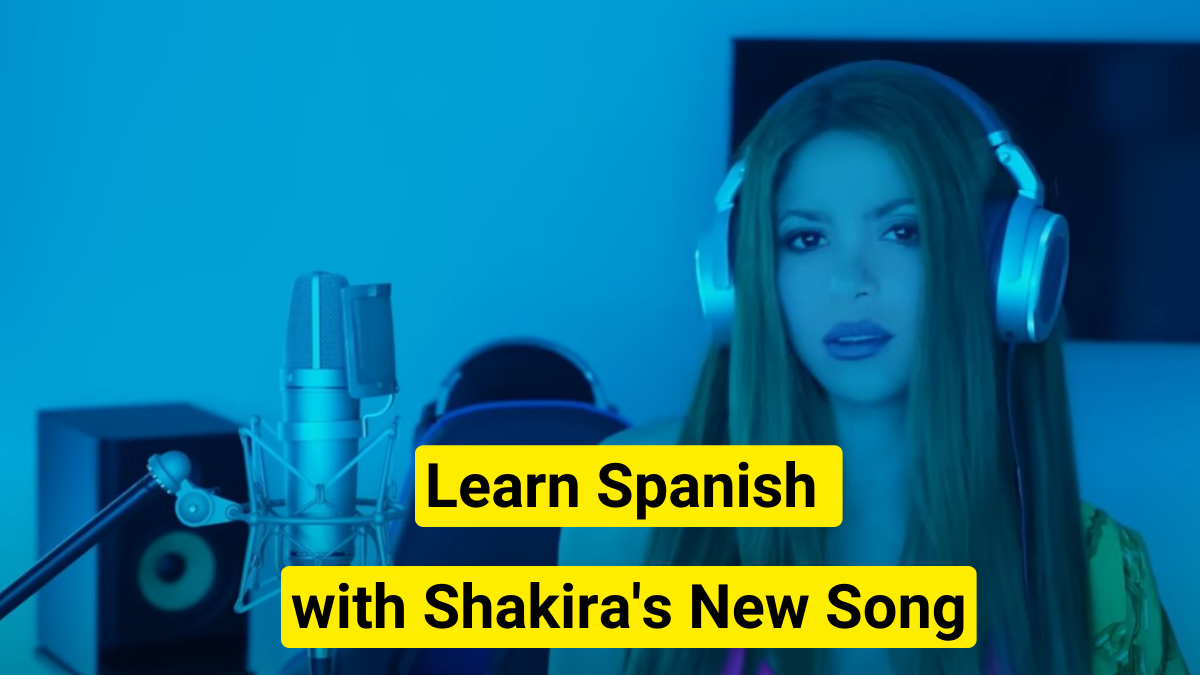As we all know, there are certain things that we don’t get taught in school. If we want to be as educated as we can be, there are many things that we have to take it upon ourselves to learn through our own research and social interactions.
One huge theme we could all learn a little more about is how to communicate with or respectfully discuss the LGBTQ+ community. And if you’re learning Spanish, what better way to expand your vocabulary than by learning the correct terms for sexuality and gender to help you understand people and conversations better!
Spain is one of the most culturally liberal countries in the world, legalising same-sex marriage in 2005, ten years before the UK and the US made the change in 2015. Argentina followed Spain in 2010, whilst Uruguay and most of New Mexico joined the club in 2013.
See also: 20 Funny Spanish Metaphors and Idioms which Sound Offensive in English
So whether you’re watching a Spanish-speaking TV show with diverse characters, you’re an English-speaking girl interested in dating Latinas, or you just simply want to know as much as possible about the Spanish language, the info below will give you all you need to know to build a solid foundation in queer Spanish vocabulary.

General Terms [Spanish = English]
(adj.) queer/gay = LGBTQ+ (recently ameliorated /queer/gay)
In Spanish, ‘queer’ is used as a generic umbrella term for all things LGBTQ+ and is used to generally or positively refer to anything or anyone exploring the spectrum. Although ‘queer’ and ‘gay’ spent a long time as insults in the English language, and have much more specific definitions in various contexts, Spanish speakers have taken both ‘queer’ and ‘gay’ and used them in a super functional, practical way, with all negative connotations stripped away (just like the newly established uses in the English language). “Me encanta la gente gay” or “Me encanta la gente queer” is just all-round love for the LGBTQ+ community!
(adj.) de ambiente = part of the LGBTQ+ community
Literally meaning ‘of the environment’, ‘de ambiente’ is a term you or your queer friends can use in Spanish to explain your relation to LGBTQ+; ‘part of the community/environment.’
(n.) aliado/aliada = ally
And if you don’t consider yourself queer, but you stand in solidarity with gay and transgender rights, you can say “Yo soy una aliada/un aliado.”

¿Qué pronombres utilizas? = What pronouns do you use?
Want to ask someone you meet if they prefer to use ‘he’, ‘she’ or ‘them’? ‘El’, ‘ella’ o ‘elle’? This is the question that will start a conversation with an open mind and an open heart so that you can be sure to get off on the right foot with everyone. However, the Spanish language is more complicated than English in the sense that every noun automatically has a gender applied to it, with pluralised words made masculine by default. This is slowly changing via the new generations who are neutralising plural nouns by adding ‘es’ instead of ‘os’. EG: ‘Abuelo’ = grandfather. ‘Abuela’ = grandmother. ‘Abuele’ = grandparent [non-binary]. ‘Abuelos’ = grandparents [traditional masc]. ‘Abueles’ = grandparents [modern neutral]. To learn how all the nouns would change for non-binary people, you can check out this awesome site that explains everything: https://strommeninc.com/how-to-use-gender-neutral-pronouns-in-english-and-when-speaking-a-foreign-language/
Sexuality [Spanish = English]
(n.) hetero/heterosexual = straight/heterosexual
This term is basically the same for both languages! Someone who is eroticall-inclined to their opposite sex and that’s that.
(n.) homosexual = gay/homosexual man
This translation is super easy to remember… A man physically and emotionally attracted towards other men.
(n.) marica/maricón = slang term for gay/‘faggot’
‘Marica’ is a term that can be used alternatively to ‘queer’, but it’s close counterpart ‘maricón’ has mostly been used as an insult to refer specifically to gay men, with Google Translate still defining the word as ‘sissy’. Socially however, ‘marica’ can be used in a friendly way similarly to the recent ownership of the word ‘fag/faggot’ in English. It can be used as an ironic or endearing term instead of an insult, meaning that context is what’s most important here. In fact, Venezuelans commonly use ‘marica’ to mean ‘dude/brother/friend’ - ‘parce/hermano/amigo’ - without any negative connotations whatsoever.
We must insist however that these terms are not to be used as they are offensive.
(n.) lesbiana = a lesbian/gay woman
Women who are physically and emotionally attracted to other women. Another translation you can’t really forget!
(n.) bollera = sang term for lesbian/‘rug muncher’
Similarly to ‘marica’, ‘bollera’ is a juicy slang word used by lesbians to lesbians in a funny and friendly manner. Google Translate defines ‘bollera’ as ‘dyke’ - but times have changed. ‘Bollo/s’ means ‘bun/s’ like bread rolls, and so ‘bollera’ literally means ‘to eat bread rolls’. This reminds me of the term ‘rug muncher’ we use in English to call someone a lesbian, referring to the act of cunnilingus... In school, this was insulting, but again, in the right context in the modern day, this is an all-inclusive loving term.
Once again, do not use this term as it is considered offensive.

(n./adj) bisexual = bisexual
The same word is used in both languages for someone who is romantically attracted to ‘both’ sexes. The term ‘bisexual’ is slowly dying out as societies discover there are, typically, two biological sexes (male and female) but a plethora of different genders.
(n./adj) pansexual = pansexual
So then comes ‘pansexual’, which has the same meaning and spelling in both languages. ‘Pansexuality,’ or ‘pansexualidad’ in Spanish, is when someone can be sexually attracted to anyone because of anything. They don’t care for people’s gender, sex or genitals, and naturally put their focus on other traits such as the sound of their voice, hair, smell, face, mannerisms, etc. Sex and gender aren’t really a part of their repertoire. This is similar to ‘demisexuality’ or ‘demisexualidad’ which is when you become sexually attracted to someone only if there is an emotional bond/connection.
(n./adj) omnisexual = omnisexual
Differing from ‘pansexualidad’, ‘omnisexualidad’ is when a person is romantically/sexually inclined to a diverse range of particular genders, but not necessarily all of them, and each ‘omnisexual’ person can have different tastes. For example, you can find an omnisexual person who is attracted to cismen, transmen and masculine women, but isn’t attracted to femme boys, transwomen or cisgirls. Equally, you can find another omnisexual person who is attracted to gender-fluid people, transmen, transwomen, but not to cis people (keep reading to find out these terms in Spanish). It’s the same spelling once again, as Spanish borrows from English.
(n./adj) asexual = asexual
To be sexually attracted to nada.
Gender [Spanish = English]
(adj.) cisgénero = cisgender
‘Cisgénero’, or ‘cisgendered’ in English, is the name given to people who identify with the gender they were given at birth, the gender that correlates with their biological sex. For example, If you were born a niño and you are still un hombre then you are cisgénero.
(adj.) transgénero = transgender
‘Transgénero’ is when someone has changed their gender, so their gender is different to the one they were given at birth. You can also just say ‘trans’ in both languages. This is not to be confused with ‘transexual’ (also the same word in both languages) which is when someone goes through medical surgery in order to change their organos sexuales/sexual organs.
(adj.) mujer trans = transwoman
When un hombre transitions into una mujer. Yo soy una mujer trans.
(adj.) hombre trans = transman
When una mujer transitions into un hombre. Yo soy un hombre trans.
(adj.) no binario = non-binary
Non-binary is when you do not define yourself with any gender in particular, when none of the boxes can explain how you feel. This is becoming more and more common as we leave gender stereotypes behind. ¡Yo tengo muchas amigues no-binaries!
(adj.) género fluido = gender fluid
To be gender fluid is to alternate from one gender to another as you like. ¡Ser libre!
(adj.) asexuado = agender
Last but not least, we look at ‘asexuado’ which means to be entirely genderless. Google Translate suggests that ‘asexuado’ and ‘asexual’ are synonyms, but although they are the same concept, they describe entirely different things. For example, you can be ‘asexual’ but not ‘asexuado’, just as you can be ‘asexuado’ without being ‘asexual’.

Conclusion
So there it is, your top twenty must-know Spanish words and phrases when you want to discuss or interact with the LGBTQ+ community. To watch these words in context and practice your pronunciation and listening skills, check out these wonderfully queer Spanish shows available on Lingopie.






![30+ Modern English Slang Terms For Money [Guide]](/blog/content/images/size/w300/2025/06/Slang-term-for-money.jpg)
![5 Official Spanish Language Tests To Show Your Proficiency Level [Guide]](/blog/content/images/size/w300/2025/06/Spanish-Language-Tests.jpg)

![Why Memorizing Spanish Words Won’t Make You Fluent [Tips]](/blog/content/images/size/w300/2025/06/how-to-practice-spanish-vocabulary.jpg)